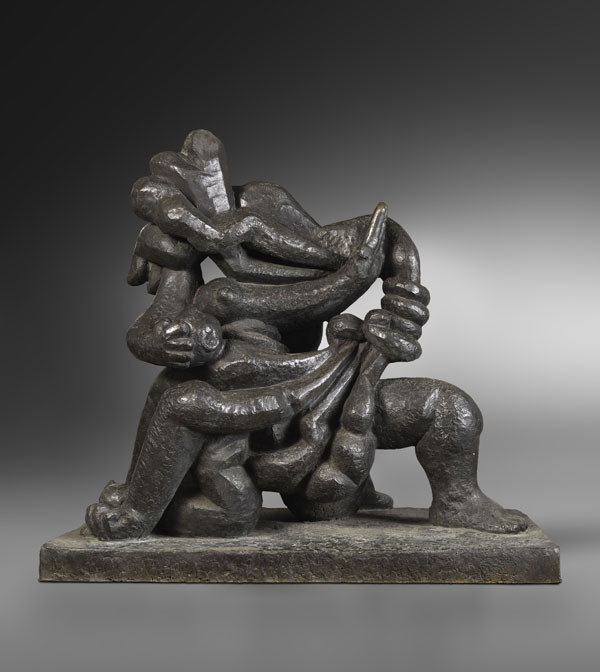Jacques Lipchitz
dal 26/10/2010 al 26/11/2010
Segnalato da
26/10/2010
Jacques Lipchitz
Marlborough Gallery, New York
Beyond Bible and Myth. Works on view date from throughout the artist's career, from his Scythian-inspired Mythological Scene of 1911, to his powerful anti-fascist statement, David and Goliath of 1933, to his bronze Hagar in the Desert of 1969. The exhibition includes approximately 50 sculptures in which he treated subjects from the Old and New Testaments. Curated by Kosme de Baranano.

Jacques Lipchitz: Beyond Bible and Myth will open at Marlborough
Gallery, 40 West 57th Street, on October 27 and continue
through November 27, 2010. The exhibition, curated by Kosme de Barañano, prominent art historian and former Executive Director of IVAM (Instituto Valenciano de Arte Moderno), Valencia, will include approximately 50 sculptures directly
related to Lipchitz’ interest in the Bible and Greek mythology.
Works on view date from throughout the artist’s career, from
his Scythian-inspired Mythological Scene of 1911, to his powerful
anti-fascist statement, David and Goliath of 1933, to his bronze
Hagar in the Desert of 1969. This will be the first exhibition of
Lipchitz’s work at Marlborough in three years and is especially
noteworthy in that it concentrates specifically on sculptures
with these themes.
Marlborough’s exhibition will include a range of sculpture by
Lipchitz in which he treated Biblical subjects from the Old and
New Testaments. Themes include Jacob and the Angel, Song
of Songs, Hagar in the Desert, The Return of the Prodigal
Son, The Tree of Life, Repentant Magdalene, The Virgin Mary
and Mother and Child. Lipchitz’ Song of Songs, 1945 (24 1/2 x
38 1/8 x 10 1/4 in.) is represented in the show by the completed sculpture as well as by a maquette for the work, First Study
for “Song of Songs”, completed the year before at one-eighth the
size. Created for a friend of the artist, Lipchitz commented in
his biography, My life, about this work: “The title, Song of Songs,
of course comes from the Old Testament, and the theme is a
love song, extremely lyrical and tender, since it was made for a
very loving couple.”
One of the highlights of the exhibition will be Lipchitz’ powerful dedication to the sanctity and joy of motherhood, Mother
and Child, 1949 (Bronze, 56 x 31 x 31 in.), that was inspired by
the birth of his own daughter in 1948. Alan G. Wilkinson,
commenting on this work, notes its relationship to Bernini’s
famous treatment of the Madonna and Child, especially Lipchitz’ “Baroque” drapery and the sinuous curves that characterize the sculpture.
Lipchitz later devoted himself to a series of bronze studies
and a final sculpture of the Virgin Mary in his commission for
the Catholic Church, Nôtre-Dame-de-Toute-Grâce, at Assy in
France. Lipchitz felt that his completed sculpture for this project, entitled Nôtre-Dame de Liesse (Our Lady of Joy), “was one
of the most important thing I have ever done.” Three casts
of this sculpture were made: one for the church at Assy, one
for Abbey of Saint Columbia on the island Iona off the coast
of Scotland, and one for which Philip Johnson designed his
Roofless Church in New Harmony, Indiana. This landmark
sculpture is represented in the exhibition by a beautiful study,
measuring 33 inches high, which features the cloaked Virgin in
a mandorla with the Holy Spirit above.
Greek mythology provided Lipchitz with a number of inspi-
rational themes for sculptures, including Theseus and the Minotaur, David and Goliath, Prometheus Strangling the Vulture
and Birth of the Muses, examples of which will be included in
the Marlborough show.
One of the most famous and powerful Greek myths, The
Rape of Europa, became the subject of three different treatments by the artist. This exhibition will feature four sculptures
dedicated to this theme, beginning in 1938 with Rape of Europa
I, 1938 (19 5/8 in.) begun just before World War II, and three
others from the period of 1969-1972, where he focuses on the
sexuality of the story as expressed through vigorous modeling
of the subjects, especially in a unique marble of 1969-1970.
Kosme de Barañano eloquently writes of Lipchitz’ multicultural approach to Biblical and mythological themes in his essay
that accompanies the catalogue:
...Lipchitz reinterprets myths and their meanings, from metheus to the Virgin Mary, from Song of Songs to The Tree of Life, and contextualizes them in their period, forcing them to speak of the reality of the moment. At the time, they are not religious or political propaganda, but a plastic song...
...Sex, violence and decorative force, tragedy, comedy and a cosmic vision, paganism and religiosity, are all inserted in a specific space with a compositional rhythm that is enormously muscular yet delicately intimate...
Born in Lithuania in 1891, Lipchitz arrived in Paris in 1909 where he quickly established himself as an artist whose impact contributed to the revolution of twentieth century art. He began exhibiting in Paris in 1912 and his first solo show took place at the Galerie de l’effort moderne (Léonce Rosenberg) in 1920. Lipchitz’ emigrated from France at the time of the first German invasion, arriving in the United States in 1941. Shortly after, Lipchtiz began exhibiting at the Buccholz Gallery, New York, and continued to exhibit in galleries and museums until his death in 1973.
An illustrated catalogue with an essay by Mr. de Barañano will be available at the time of the exhibition.
Image: Hagar in the Desert, 1969. Bronze 66 x 70 x 45 inches. Edition of 7
For press inquiries please contact Janis Gardner Cecil at Marlborough Gallery at 212.541.4900
or jcecil@marlboroughgallery.com
Marlborough Gallery, Inc.
40 West 57th Street New York, NY 10019
Gallery Hours: Tues-Sat 10-5:30



